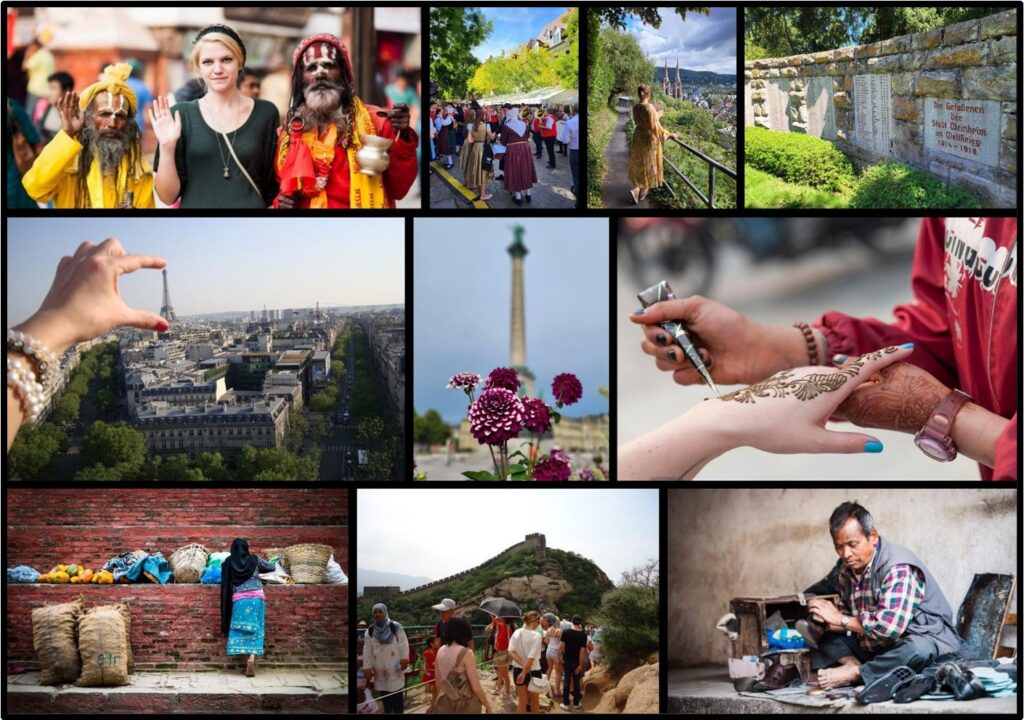
Effective communication is crucial in creating transformative and unforgettable travel experiences. By crafting meaningful and thought-provoking content, such as inspiring stories, captivating visuals, or practical tips and advice, tourism organisations can engage their audience and inspire them to explore new horizons and embark on a journey of personal growth and discovery. The right type of content can establish a deep and lasting connection with the audience, facilitating profound and life-changing travel experiences.
Authors: Jade Myburgh & Johanna Heinonen
Less studied eudaimonic communication
One fascinating area of study that sheds light on the power of communication in the context of effectiveness is eudaimonic communication (Myburgh 2024). This field of research explores content that promotes human flourishing, highlighting the importance of creating content that goes beyond mere entertainment or information and instead fosters a sense of purpose and meaning. By leveraging the insights and principles of eudaimonic communication, tourism organisations can create content that resonates deeply with their audience, inspiring them to seek out new experiences and embrace personal growth and transformation.
Transformative tourism
Tourism and travel have transformed from being a means of relaxation to providing opportunities for personal growth and transformation. By exposing tourists to new cultures, ideas, and ways of life, transformative tourism can bring about positive changes in attitudes, values, and behaviours, leading to long-term lifestyle changes (Pung et al. 2020; Amaro et al. 2023). To create authentic transformative travel experiences, engaging and effective communication strategies are crucial. One way to do this is by producing content that elicits a meaningful message or provokes a need to fulfil a life purpose. Organisations often create content surrounding themes that help the audience better understand the important aspects of life (Rieger & Klimmt 2018).
Rieger and Klimmt (2018) also suggest that social media and conventional mass communication are the sources of meaningful content that audiences use to create, share, and consume messages with eudaimonic potential. Exploring how communication strategies that embody eudaimonic elements lead to meaningful consumer experiences can help organisations create influential content. For instance, storytelling is a powerful tool for creating emotional connections and helping tourists engage with their surroundings, leading to a better understanding of their travel destination and tourism experience (Sheldon 2020). However, research on eudaimonic communication requires further investigation to fill the current theoretical gaps in communication’s potential in transformative tourism.
Eudaimonic communication
Tourism organisations that want to provide their customers with unique and fulfilling experiences should aim to create transformative experiences that inspire personal growth and development (Ryan & Deci 2001; Huta & Waterman 2013). To do this, organisations must develop communication strategies that focus on eudaimonia and highlight elements such as the pursuit of happiness, personal fulfilment, and cultivating positive emotions. By doing so, they can differentiate themselves from their competitors and provide customers with memorable experiences. Creating memorable marketing messages is essential for businesses to establish meaningful customer connections. Organisations can impact their customers meaningfully by creating communication moments that lead to reflection and memorability (Lerman & Mejia 2018).
For this reason, marketers are increasingly exploring how marketing can contribute to individual and societal well-being. Eudaimonic happiness, rooted in meaningful and fulfilling lives, is a key component of long-term well-being. Marketers should focus on these areas to create a more positive and fulfilling consumer experience. In addition, empathy is also essential in creating and nourishing transformative interactions with customers (Heinonen and Pesonen 2022). By listening to customers personally and providing them with unique, tailored solutions, organisations can exceed their customers’ expectations and create positive memories for them.
A shift towards transformational communication
Businesses today face a constant challenge to connect with their customers in meaningful ways. One way to do this is by using eudaimonic communication strategies, which can help promote personal growth, self-reflection, meaning, and customer well-being. By creating positive emotional experiences through storytelling, businesses can create a sense of connection and empathy with their audience. This approach requires businesses to focus on the key elements of eudaimonia, such as fostering positive emotions and personal development to establish a more meaningful relationship with their audience. Businesses must focus on the positive impact their service offerings can have on the lifestyle of their customers. Rather than focusing on just the tangible features of a product or service, it is essential to tap into customer’s emotions and deliver content that resonates with them. By creating transformational marketing content that inspires customers to act, businesses can showcase how their product or service can fulfil the needs and aspirations of their customers (Dennis 2021). In addition to inspiring customers, eudaimonic communication strategies can create opportunities for reflection and memorability, resulting in a more engaged audience. By motivating customers to engage in activities that promote well-being, businesses can positively impact their customers’ lives. Eudaimonic communication is a powerful tool for businesses seeking to establish genuine connections with their customers. Businesses can create a more authentic and meaningful relationship with their audience using these strategies.
References
Amaro, D., Caldeira, A.M. & Seabra, C. 2023. Transformative experiences in tourism: A conceptual and critical analysis integrating consumer and managerial perspectives. Tourism and Hospitality Research. Cited 11 March 2024. Available at https://doi.org/10.1177/14673584231182971
Dennis, L. 2021. Six Ways to Pivot to Transformational Marketing and Sales Messaging. Value Proposition. Cited 11 March 2024. Available at https://valueproposition.com/blog/six-ways-to-pivot-to-transformational-marketing-and-sales-messaging/
Heinonen, J. & Pesonen, J. 2022. Identifying the elements of great online customer encounters. Information and Communication Technologies in Tourism 2022. 271–281. Cited 11 March 2024. Available at https://doi.org/10.1007/978-3-030-94751-4_24
Huta, V. & Waterman, A.S. 2013. Eudaimonia and its distinction from hedonia: Developing a classification and terminology for understanding conceptual and operational definitions, Journal of Happiness Studies. Vol. 15 (6), 1425–1456. Cited 11 March 2024. Available at https://doi.org/10.1007/s10902-013-9485-0
Lerman, D. & Mejia, S. 2018. Positive marketing, virtue, and happiness. The Routledge Handbook of Positive Communication. 151–159. Cited 11 March 2024. Available at https://doi.org/10.4324/9781315207759-16
Myburgh, J. 2024. The impact of eudaimonic communication strategies in creating transformative tourism experiences. Thesis. Master’s degree programme in Business Administration, International Tourism and Event Management in LAB University of Applied Sciences. Cited 11 March 2024. Available at https://urn.fi/URN:NBN:fi:amk-202403043731
Pung, J., Gnoth, J.& Del Chiappa, G. 2020. Tourist transformation: Towards a conceptual model. Annals of Tourism Research. Vol. 81, 102885. Cited 11 March 2024. Available at https://doi.org/10.1016/j.annals.2020.102885
Rieger, D. & Klimmt, C. 2018. The daily dose of digital inspiration: A multi-method exploration of meaningful communication in social media. New Media & Society. Vol. 21(1), 97–118. Cited 11 March 2024. Available at https://doi.org/10.1177/1461444818788323
Ryan, R.M. & Deci, E.L. 2001. On happiness and human potentials: A review of research on hedonic and eudaimonic well-being. Annual Review of Psychology. Vol. 52(1), 141–166. Cited 11 March 2024. Available at https://doi.org/10.1146/annurev.psych.52.1.141
Sheldon, P.J. 2020. Designing tourism experiences for Inner transformation. Annals of Tourism Research. Vol. 83. Cited 11 March 2024. Available at https://doi.org/10.1016/j.annals.2020.102935
Authors
Jade Myburgh is a graduate of the Master’s programme in Business Administration, International Tourism and Event Management at LAB University of Applied Sciences.
Johanna Heinonen is a Senior Lecturer and RDI Specialist at LAB University of Applied Sciences. She is particularly passionate about studying how communication can improved in terms of sales and effectiveness as well as caring and memory imprint.
Illustration: Myburgh, R. 2013. Immersive Travels.
Published 27.3.2024
Reference to this article
Myburgh, J. & Heinonen, J. 2024. Can eudaimonic communication strategies create transformative tourism experiences? LAB Pro. Cited and the date of citation. Available at https://www.labopen.fi/lab-pro/can-eudaimonic-communication-strategies-create-transformative-tourism-experiences/






